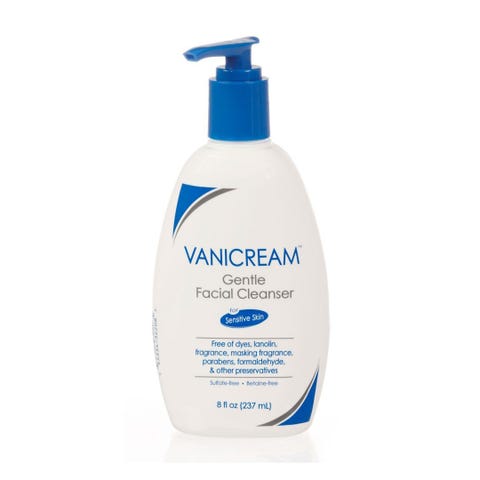How to Get Rid of Eczema Spots on Face
Your first instinct when you see a scary eczema patch spreading across your face might be to go on a selfie hiatus—stat. (Or at least get really creative with your angles.) But it doesn't have to be that way.

Amanda Becker
To help you conquer the eczema on your face, Sejal Shah, M.D., a board-certified dermatologist and founder of SmarterSkin Dermatology in NYC, lays out everything you need to know about those rageful face patches:
Remind me: What is eczema?
"Eczema refers to a group of conditions that cause the skin to become red, itchy, scaly and inflamed," Shah says. The inflammatory skin condition can be triggered by genetics, irritants, or allergies—messing up your skin's barrier and causing it to dry out and crack. (More on that in a sec.)
How do I know if that's what's on my face?
There are some pretty obvious signs. "Patches of eczema are red, itchy, dry, scaly, and can sometimes develop tiny blisters and weep clear fluid," Shah says—making them pretty different from the dry patches that can crop up occasionally.
The other key thing about eczema: It doesn't just go away on its own (no matter how good your regular skincare routine is). If those patches on your face stay put, come back, or get even worse, you're likely dealing with some kind of eczema rather than simple dry skin.
What causes facial eczema?
This is where it gets a little complicated. "There are several types of eczema," Shah says. "Atopic dermatitis is the most common form, and often when people say 'eczema' this is the condition they are referring to."
Atopic dermatitis is chronic, meaning that it comes and goes over a long period of time, according to the National Eczema Association. It's generally caused by genetics, and can flare up in the face, arms, legs, and other parts of the body.
Another type of facial eczema: contact dermatitis. This is a form of eczema that is triggered by one specific irritant, like extreme weather, super-hot showers, skincare ingredients, laundry detergents, fragrances—the list goes on. What triggers eczema in one person may not irritate another person's skin at all.
How to get rid of eczema on your face
Luckily for anyone with eczema, finding relief from an itchy red face can be as simple as finding eczema-friendly skincare products at your local drugstore.
First, stock up on 1 percent hydrocortisone cream (to nix redness and itchiness). Dab that over your eczema patches, rinse off gently after 10 minutes, and then follow with a rich moisturizer to seal in hydration. Note: You should only use hydrocortisone (which is a steroid) for a week max at a time. So if you're not seeing results, head to a derm.
You'll also want to swap out your skincare routine for products that will hydrate you without making your problem worse. Shah recommends avoiding harsh or irritating ingredients, like fragrances, dyes, exfoliants like glycolic acid, and plant extracts. Look instead for gentle, moisturizing ingredients like colloidal oatmeal, ceramides, and shea butter. (And when in doubt, go for products that have a seal from the National Eczema Association.)
Not sure which drugstore products are actually worth testing on your quest for an eczema-free face? Here are a few of Shah's picks:
Eczema-Friendly Skincare Products

Aquaphor Healing Ointment
BUY IT
$11, amazon.com
This best-selling cream touts a fragrance-free formula that's clinically proven to heal irritated skin.

Vanicream Gentle Facial Cleanser
BUY IT
$9, amazon.com
This gentle face wash cleanses without stripping dry, sensitive skin. Plus, it's free of common irritants (like lanolin, paraben, and fragrance) that can trigger contact dermatitis, too.

CeraVe Facial Moisturizing Lotion AM Broad Spectrum SPF 30
BUY IT
$17, ulta.com
Formulated with skin-soothing niacinamide and moisturizing hyaluronic acid, you can expect a healthy dose of hydration to keep the eczema on your face at bay.

Avene Cicalfate Restorative Skin Cream
BUY IT
$28, dermstore.com
Hypoallergenic and non-comedogenic, this power-packed formula works to soothe skin and restore the skin barrier to minimize irritation often associate with eczema.
What if none of that works?
If all else fails, it's time to head to the dermatologist. "Schedule a consult with a board-certified dermatologist to confirm the diagnosis," Shah says. If your dermatologist does end up saying that OTC products simply won't cut it for your complexion concerns, they'll be able to prescribe you a treatment (like a prescription-strength steroid cream) on the spot, navigating you one step closer to the redness- and irritation-free complexion of your dreams.
Rebecca Norris Rebecca Norris is a full-time freelance writer living in the DC metro area.
This content is created and maintained by a third party, and imported onto this page to help users provide their email addresses. You may be able to find more information about this and similar content at piano.io
How to Get Rid of Eczema Spots on Face
Source: https://www.womenshealthmag.com/beauty/a21765033/eczema-on-face-treatment/